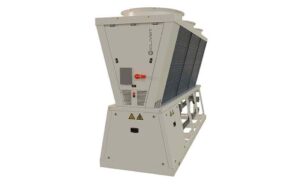UK weather turns up the heat on building services
20th July 2022
UK: The record-breaking UK heatwave has highlighted the increased demand for better long-term strategies to improve temperature, humidity, and air quality in buildings, says the Building Engineering Services Association (BESA).
While the UK has no legal upper limit on extreme temperatures at which workers can refuse to work, the heatwave has again brought calls from trade unions for a 27ºC limit on outside working and 30ºC inside.
However, BESA pointed out that numerous studies have shown detrimental impacts on human health and productivity at temperatures well below those levels.
Research from the US space agency NASA has shown that human productivity falls by 3.6% for every 1ºC the indoor temperature rises above 22ºC, and the British Council for Offices (BCO) recommends temperature in commercial buildings should be maintained at between 20ºC and 24ºC.
The latter also recommends ventilation rates of 12 litres/sec/person of filtered air with an additional 10% in high density occupied spaces to protect the health and well-being of occupants.
The BCO also says that controlling humidity is crucial, but its most recent studies showed the average relative humidity in offices was 38% whereas for good health it should be between 40 and 60%. At 35% people will experience eye irritation, nasal dryness, and sore throats. This also has important implications for making our buildings more infection resilient to reduce the impact of viruses, flu, and colds.
Reluctance
BESA said many building owners and managers were reluctant to invest in measures they believed would only have an impact during extreme temperature events on just a few days of the year. They have also been put off by rising material costs, skills shortages, and a failure to see health resilience measures as part of a wider effort to improve building performance.
“The poor performance of our building stock tends to hit the national headlines during periods of extreme heat or cold, but then to drop into the background again,” said BESA’s head of technical Graeme Fox. “However, this time feels a bit different. I think the pandemic and the current energy crisis have concentrated minds – so the heatwave has created further momentum for addressing this in a more strategic way.”
Fox also believes the publicity surrounding heat pumps and growth in that market will also have an impact with more end users able to take advantage of a technology that heats in winter and cools in summer. “Some of those early heat pump adopters were probably feeling a bit smug this month,” he said.
The heatwave also turned the spotlight on the wider economic implications of building performance, according to BESA, with surveys suggesting a significant number of home workers returned to their offices to take advantage of the air conditioning. Some employers claimed this had improved productivity and could lead to a reversal in the working from home trend.
The Met Office said the UK could experience extreme heat events every three years from now on and economists believe rising temperatures will have a direct impact on economic output.
Implications
“There is a lot going on with our climate and plenty of theories flying around about the likely impact on health, well-being and productivity, but one thing we can all be sure of is that higher summer temperatures are here to stay,” said Fox. “This has important implications for the building engineering sector and means our efforts to adapt existing buildings to the effects of climate change are increasingly important.”
He stressed, however, that this was not an attempt by BESA to promote air conditioning; rather it wanted to encourage a “nuanced approach to indoor climate control”.
“Air conditioning is a key technology, but so are some of the other tools we have at our disposal such as mechanical ventilation with heat recovery (MVHR), air filtration, and humidity control. We also need to improve our approach to the fabric of buildings so we can build in more passive mitigation measures – and planned maintenance will be key to ensuring equipment can continue to function properly whatever the weather conditions.
“All of these require some level of financial investment, but not all are expensive – and with the barrage of different factors now facing our building stock, any investment in building performance is guaranteed to pay back handsomely.”







